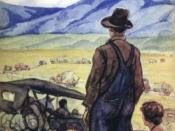Grapes of Wrath Final Writing Assessment - Jason Rivkin
Comparison of Steinbeck's essay "What's happening to America" and Grapes of Wrath by John Steinbeck
Throughout the Grapes of Wrath, the American spirit was defined by a capitalistic nature, one where society is divided into rich and poor, privileged and underprivileged. While the rich and privileged try to maintain their power and social standing by wielding their influence over the weak and vulnerable, the underprivileged, while motivated to perpetuate a more successful and fruitful life, are endowed with an indefinable wrath. That bitterness and resentment fuels their desire to make something for themselves and defeat their superiors despite all odds and they accept their underdog role. The landowners would rather see innocent people starve than lose a penny from their pocket. A social Darwinism was created where only the rich and invincible would survive and flourish, and the weak and vulnerable would die and perish.
Despite all these imperfections in the moral fabric of society, no change were effected. People were cast in unchangeable roles, and instead of fighting to make improvements, people accepted their fate with complacency.
In Steinbeck's Essay "What's Happening to America," Steinbeck, not surprisingly, describes a similar American spirit of complacency. Since as a society we currently are indulged and have no true needs. According to Steinbeck, we eat too much, drink too much, and constantly live in a state of turmoil. An attitude of 'laziness, sloppiness, indiscipline, selfishness, and piggery' dominates our youth. This lack of necessity creates the wanting and desiring of more things, and this restless desire is detrimental. Steinbeck argues that 'success, comfort leisure and self-satisfaction' causes us to reflect on our glorious past instead of inspiring change for the future. He rationalizes this by saying that Americans feel like they have...



Awful
absolutely terrible
3 out of 3 people found this comment useful.